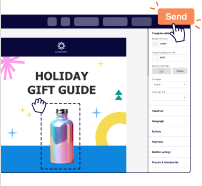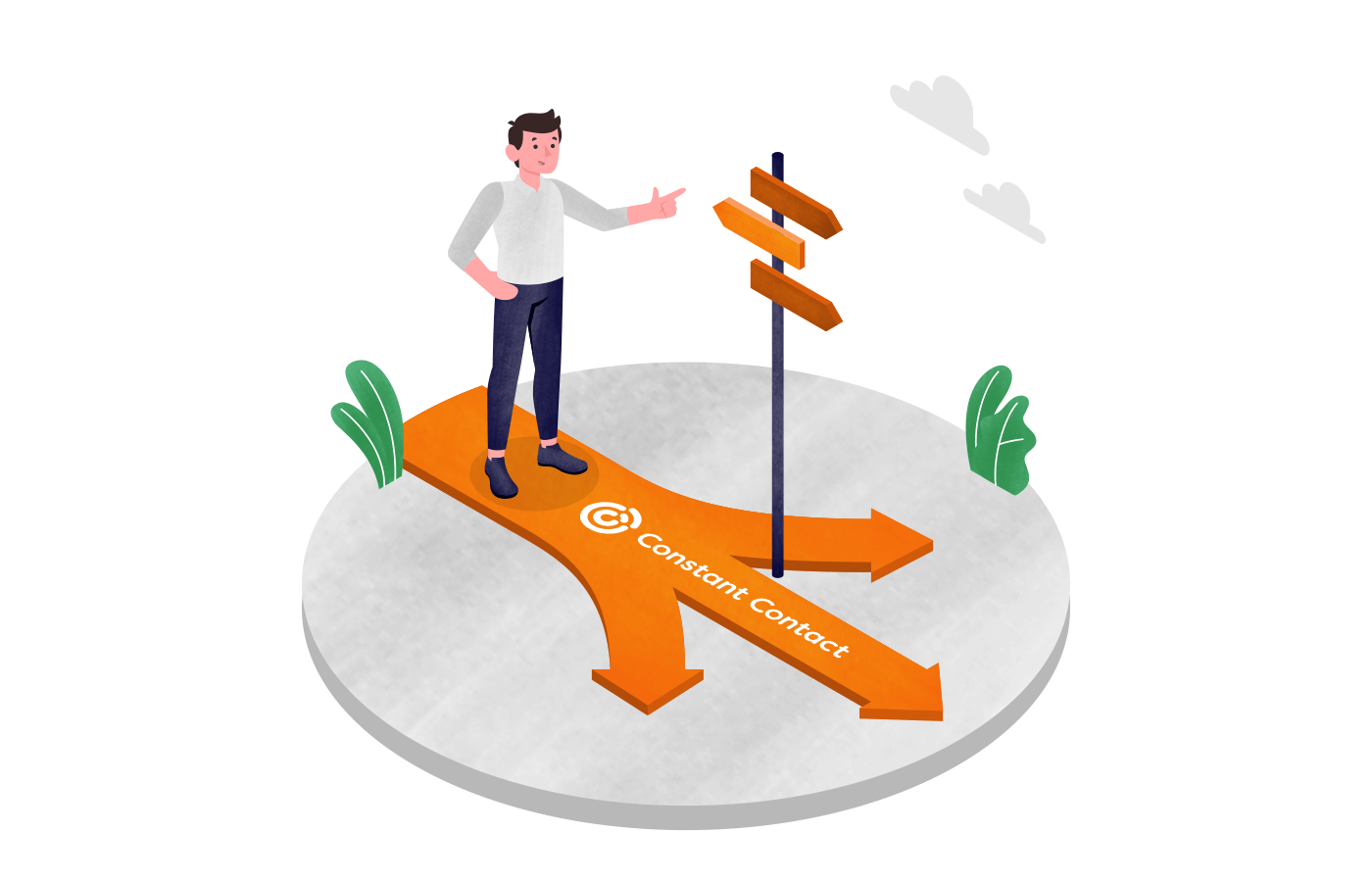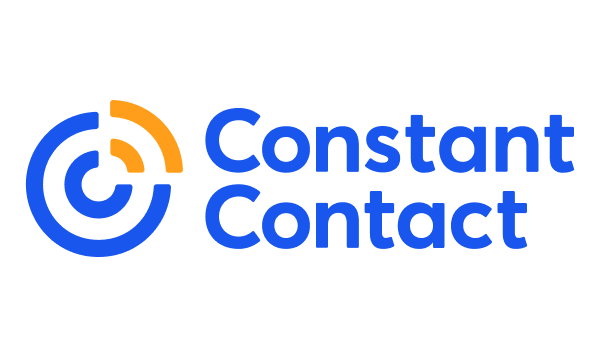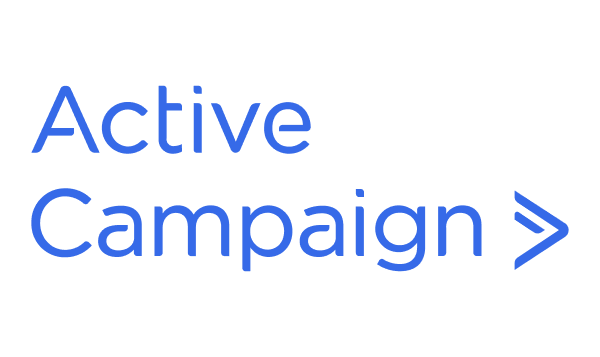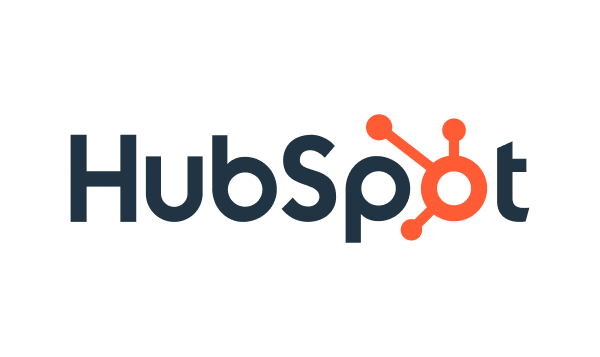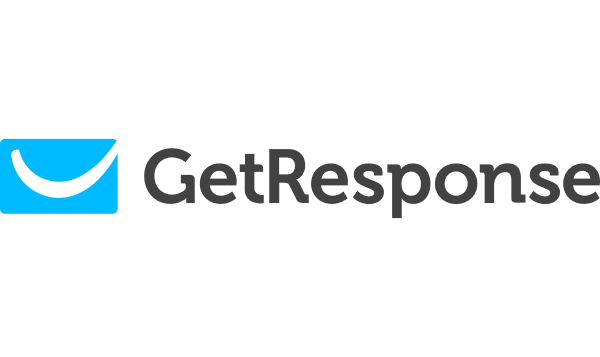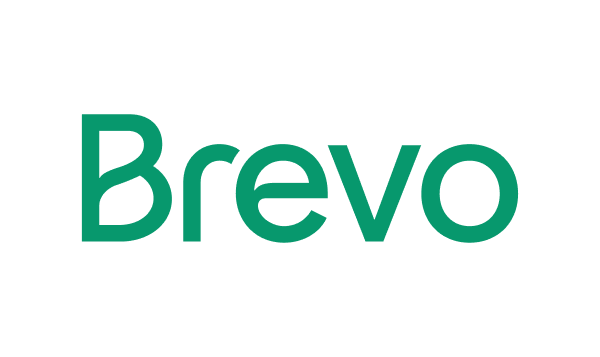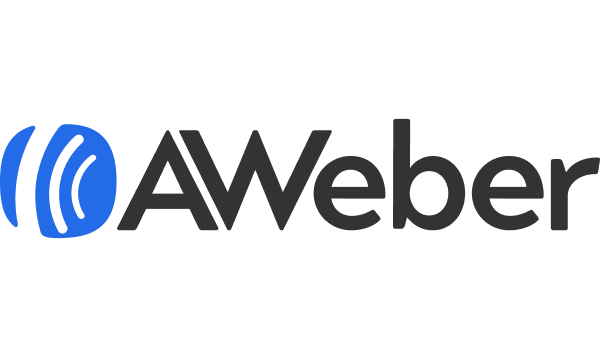Constant Contact had its moment as an easy entry into email marketing. But now, many companies are finding it limited, overpriced, and missing the flexibility modern marketing demands. You might be looking for the best Constant Contact alternatives, and you’re not alone. Many businesses are exploring a range of services like Constant Contact that offer compelling features for all sizes.
The good news is that the world of email and SMS marketing has exploded recently. You’ve got options! I dug into the data and found ten Constant Contact alternatives that give you more features and flexibility.
Disclaimer: This article evaluates Constant Contact alternatives, including Sender, which our company owns. Assessments are based on research, industry standards, and user feedback. No commissions are earned from links in this article.
Constant Contact Overview
Constant Contact is a long-standing email marketing platform tailored for small businesses that want reliable, easy-to-use tools. The platform blends email campaigns, automation, list management, and event marketing into a streamlined system that helps organizations expand their reach without a steep learning curve.
By simplifying campaign creation with drag-and-drop templates and built-in analytics, Constant Contact allows business owners and marketing teams to focus less on setup and more on building stronger customer engagement. It particularly resonates with nonprofits, local retailers, and service providers who value user-friendly design, dependable deliverability, and event management features alongside Constant Contact’s automation.
Features
- Intuitive landing page & email builder;
- Comprehensive event management tools;
- Responsive phone & chat support;
- Top-notch email & event marketing tools;
- In-depth analytics.
Pros & Cons
| ✅ Pros | ❌ Cons |
| Intuitive drag-and-drop builder | Limited automation & segmentation |
| Timezone-based scheduling | Steep pricing model |
| Excellent customer support | Outdated interface |
| Works seamlessly with ecommerce platforms | No ‘Free forever’ plan |
Pricing & Value Concerns
Here’s a full breakdown of Constant Contact’s pricing:
- Free 30-day trial: $0 (100 contacts—100 email sends);
- Lite: $12/month (500 contacts—5,000 emails/month);
- Standard: $35/month (500 contacts—6,000 emails/month);
- Premium: $80/month (500 contacts—12,000 emails/month).
Constant Contact positions itself as a solution for small to mid-sized businesses, but its pricing doesn’t match the relatively basic feature set. While plans begin at $12/month for 500 contacts, costs climb quickly—and many standard features like segmentation and automation come at a premium.
Functional Limitations
While Constant Contact has secured its place as one of the better email marketing solutions for newcomers, it’s certainly not perfect. Here are some of its limitations according to Constant Contact user reviews:
- Dated user experience. The interface feels somewhat old-fashioned, making campaign creation and navigation less smooth than on newer platforms (G2);
- Basic automation & segmentation. Workflow options and audience targeting are limited, restricting the ability to deliver highly personalized campaigns (G2);
- No lasting free plan. Constant Contact only offers a temporary trial—continued use requires a paid subscription, which may be a drawback for startups or budget-conscious small businesses (G2).
If you’re on the hunt for reliable Constant Contact alternatives, you’ll find a surprising number of options out there. The market is full of platforms similar to Constant Contact, each with its strengths and features.
Constant Contact Alternatives Comparison — A Quick Roundup
This abundance of Constant Contact competitors means you can find a platform that aligns perfectly with your budget, business size, and specific marketing needs.
Here’s a quick roundup of the best Constant Contact alternatives:
| Alternative | Starting Price | Free Plan | Overall rating |
| Sender | $7/month | Yes. Up to 2,500 subscribers + 15,000 emails/month | 4.7 |
| ActiveCampaign | $15/month | No | 4.1 |
| Klaviyo | $30/month | Yes. Up to 250 contacts + 500 emails/month | 3.9 |
| HubSpot | $10/month | Yes. Up to 2,000 emails/month | 3.7 |
| GetResponse | $15/month | Yes. Up to 500 contacts + 2,500 emails/month | 4.2 |
| Brevo | $8/month | Yes. Up to 500 contacts + 5,000 emails/month | 4.5 |
| Mailchimp | $20/month | Yes. Up to 500 contacts + 1,000 emails/month | 3.9 |
| Omnisend | $11/month | Yes. Up to 250 contacts + 500 emails/month | 4.6 |
| AWeber | $13/month | No | 3.7 |
| Campaign Monitor | $12/month | No | 4.1 |
If you’re contemplating making a switch and need a comprehensive review of better email marketing services than Constant Contact, you’ve come to the right place. Many businesses are searching for free Constant Contact alternatives as they explore their options.
That said, throughout this article I’ll use third-party resources, Capterra reviews, and our domain expertise to make comparisons of Constant Contact competitors.
Constant Contact Alternatives Reviewed
- Sender — Best Value for Automation and Multichannel Campaigns;
- ActiveCampaign — Great Overall for Advanced Automation, CR;
- Klaviyo — Top choice for Ecommerce, unmatched Shopify Integration;
- HubSpot — Powerful All-In-One Marketing Automation, but pricey;
- GetResponse — Versatile Platform with Automation, Webinars, Funnels;
- Brevo — Affordable Multichannel Platform with Strong Automation;
- Mailchimp — Popular, Beginner-Friendly, Strong Integrations;
- Omnisend — Best for Ecommerce Email and SMS Integration;
- AWeber — Reliable with Good Templates, but Less Advanced Automation;
- Campaign Monitor — Excellent Design Tools and Salesforce Integration.
By the time you end up reading this blog, you’ll have all the details you need about the best email marketing platforms like Constant Contact to make an informed decision. So, let’s begin:
Sender — Best Value for Automation and Multichannel Campaigns
Sender puts you in the driver’s seat with powerful automation features—even on the free plan. If you’re simply looking for a cheaper Constant Contact alternative, you won’t find a better deal.
Design intricate workflows triggered by specific actions like website visits, link clicks, or purchases, ensuring your emails reach the right people at the perfect moment.
Best for: Ecommerce, bloggers, and small-to-medium businesses (SMBs) looking for a robust email marketing platform;
Sender Pricing: Starts at $7/month for 1,000 subscribers + 12,000 monthly emails;
Free plan: Available for up to 2,500 subscribers + 15,000 monthly emails.
But Sender isn’t just about automation—it also excels in design and ease of use. Choose from a library of beautifully designed templates to make your emails stand out, or create your own using the intuitive drag-and-drop editor.
With its unbeatable combination of robust automation, and a generous free plan—which feels advanced compared to Constant Contact’s one—Sender is a top contender for businesses looking to replace Constant Contact and take their email marketing to the next level.
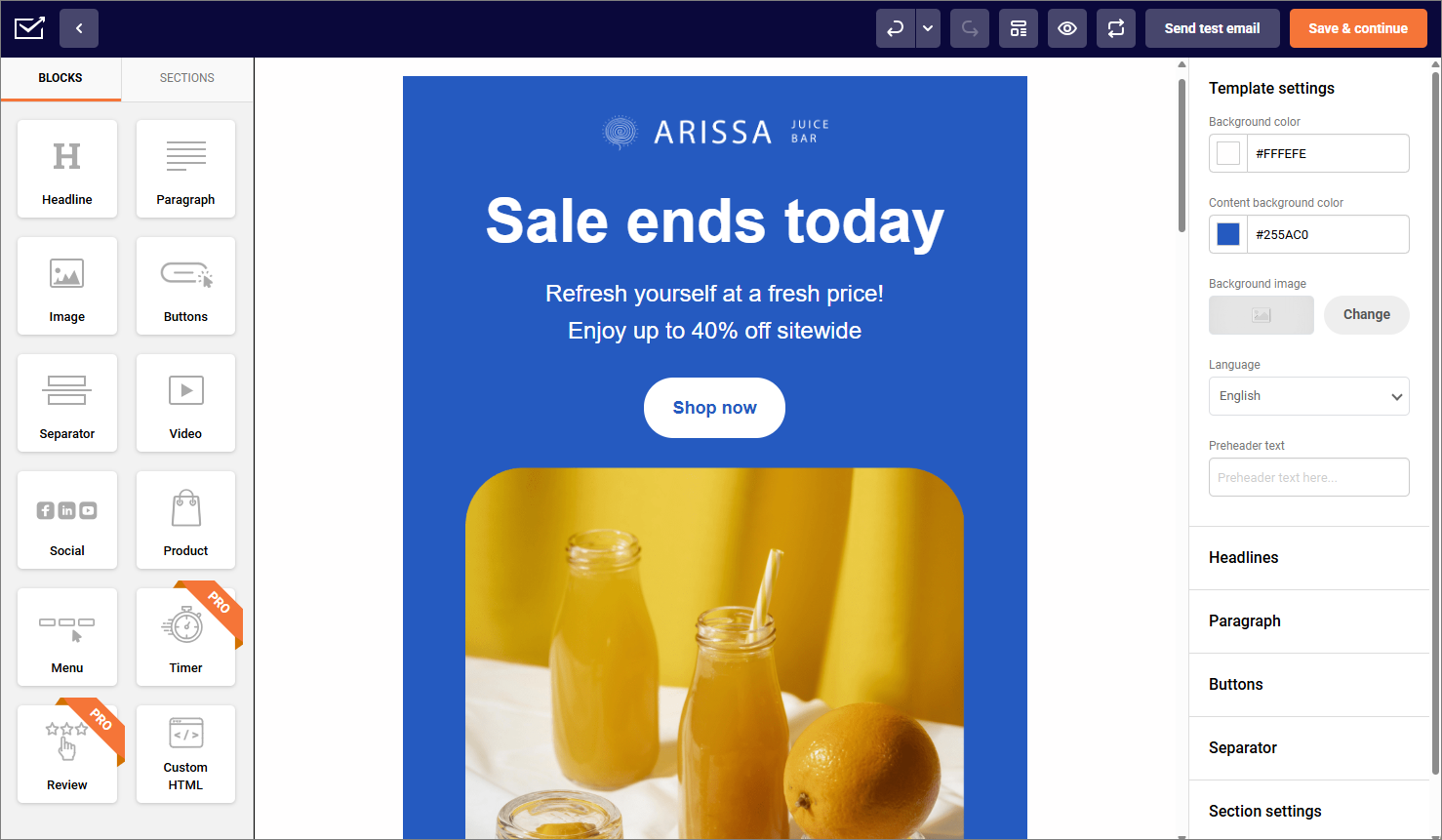
Why It Beats Constant Contact
- Wallet-friendly pricing structure;
- Unlimited custom fields in segmentation (even on starter tier);
- 24/7 human support;
- SMS marketing (which is only available in the US for Constant Contact);
- Superb landing page builder.
Key Features
- Intuitive email builder with readymade blocks;
- Live chat support with fast response times;
- Advanced segmentation and personalization;
- Automation builder and premade workflows;
- Exceptional email deliverability rates;
- Signup and popup form builder.
Pros & Cons
| ✅ Pros | ❌ Cons |
| Advanced automation tools | Free plan includes Sender branding |
| Easy-to-use interface | Lacks built-in CRM features |
| State-of-the-art segmentation functionality | |
| 24/7 human support | |
| Comprehensive analytics |
Constant Contact vs Sender
Sender packs advanced automation features that rival Constant Contact, even on its free plan. This means you can design intricate email sequences and target subscribers based on their behavior without breaking the bank.
While Constant Contact offers a broader range of features, you’ll often pay a premium for capabilities that Sender provides at a fraction of the cost. This makes Sender the best from Constant Contact alternatives.
ActiveCampaign — Best for Advanced CRM
ActiveCampaign is the platform of choice for businesses seeking a powerful blend of advanced marketing automation and sophisticated CRM capabilities. Unlike some Constant Contact competitors, it gives comprehensive customer engagement software tools designed to help you build meaningful relationships and maximize customer lifetime value.
Best for: Businesses looking for advanced email automation, CRM integration, and in-depth customer journey tracking;
ActiveCampaign Pricing: Starts at $15/month for up to 1,000 contacts + 10,000 monthly emails;
Free plan: Not available. 14-day free trial available.
While Constant Contact offers basic list segmentation, ActiveCampaign empowers you to segment your audience with laser precision based on a wide range of criteria, including website behavior, email engagement, purchase history, and custom fields.
This granular level of segmentation allows you to create highly targeted campaigns that resonate with each individual, leading to higher engagement and conversion rates.
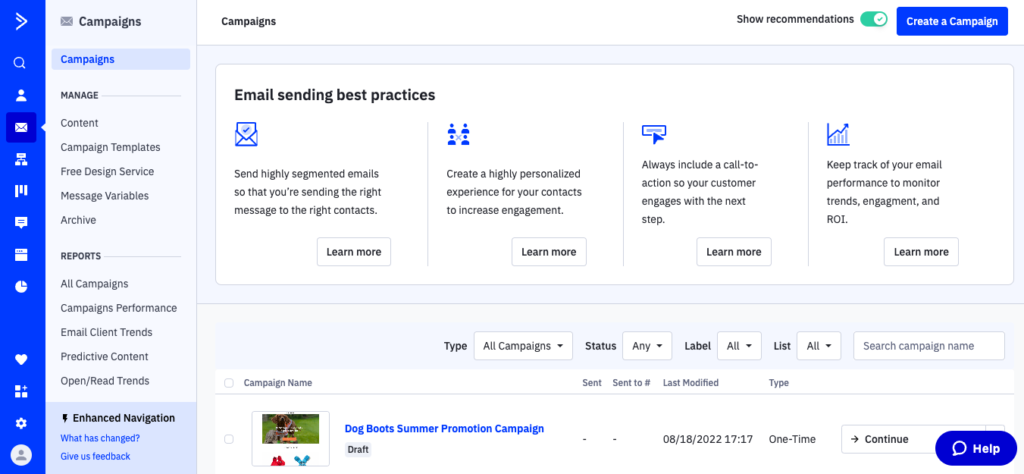
Why It Beats Constant Contact
- Superior analytics & insights;
- Automation depth;
- More extensive integration library.
Key Features
- Top-tier automation & personalization capabilities;
- Drip campaign sequences;
- Lead and contact scoring for sales funnel automation;
- Site tracking and event monitoring;
- Built-in CRM funnel.
Pros & Cons
| ✅ Pros | ❌ Cons |
| CRM integration | Outdated template library |
| Reliable email deliverability | Steep price jumps when upgrading |
| Advanced segmentation | |
| Over 900 native integrations |
Constant Contact vs ActiveCampaign
While both platforms offer email marketing tools, Constant Contact vs ActiveCampaign comparison shows they cater to different levels of marketing expertise. Constant Contact, with its simpler automation and segmentation, might be suitable for beginners, but for businesses that need stronger automation, ActiveCampaign is the go-to alternative to Constant Contact.
Klaviyo — Top Choice for Ecommerce, Unmatched Shopify Integration
Klaviyo, a relative newcomer in email marketing, is built for businesses that want advanced email automation and deep customer insights, making it one of the strongest Constant Contact competitors for ecommerce.
Best for: Ecommerce and Mid-sized DTC brands looking for an email marketing software with advanced tools;
Klaviyo Pricing: Paid plans start at $30/month for up to 1,000 contacts and up to 10,000 emails/month;
Free plan: Available for up to 250 contacts and 500 monthly emails.
In testing with a Shopify store, I created a multi-branch automation based on browsing, cart value, and purchase history—boosting engagement and conversions in less than a week. Features like product recommendations and smart send-time optimization feels sophisticated compared to Constant Contact’s basic automation.
While the interface can feel complex for beginners, experienced marketers and agencies will value the control it provides. Klaviyo does offer a limited free plan, but its full capabilities come at a premium price.
All in all, ecommerce brands looking for a data-driven alternative to Constant Contact will find Klaviyo’s predictive insights unmatched.
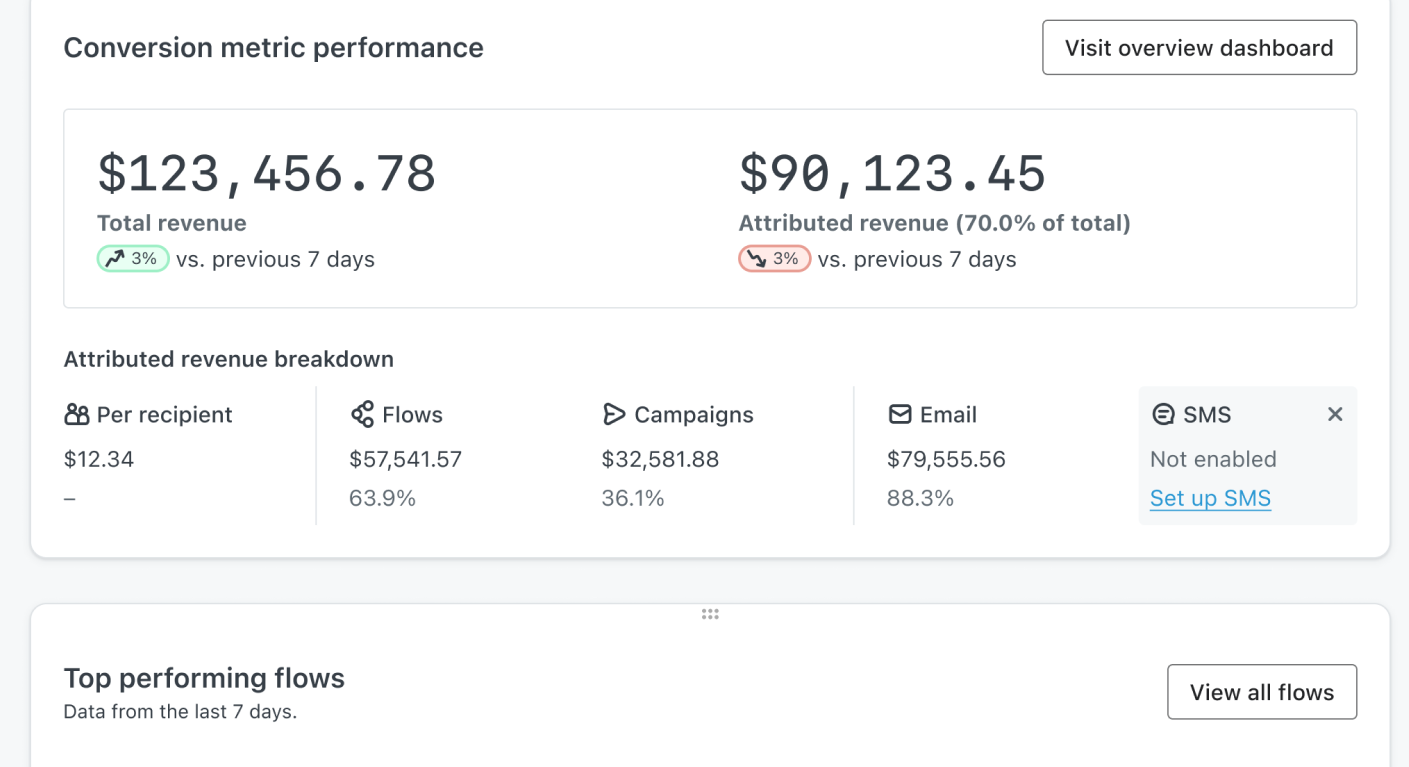
Why It Beats Constant Contact
- Ecommerce focused;
- Free plan;
- Better revenue attribution;
- Advanced segmentation;
- Predictive send times & product recommendation features.
Key Features
- Data-driven segmentation;
- Predictive analytics;
- Advanced personalization;
- Unified platform;
- Powerful A/B testing tools.
Pros & Cons
| ✅ Pros | ❌ Cons |
| Deep ecommerce integration | Steep learning curve |
| Strong automation features | Support prioritizes higher-tier accounts |
| Top-tier A/B testing capabilities | Advanced features are behind a paywall |
| Intuitive visual automation builder |
Constant Contact vs Klaviyo
Constant Contact provides an easy-to-use platform with core email marketing tools, making it a solid choice for small businesses or beginners. It covers essentials like drag-and-drop templates, basic automation, and contact management, but its feature set is fairly limited.
In contrast, Klaviyo is designed for growth-focused ecommerce brands. With advanced segmentation, AI-powered automation, predictive analytics—not to mention deep Shopify integrations—it goes far beyond the basics.
While Constant Contact is more approachable for newcomers, Klaviyo delivers the data-driven precision and flexibility that larger stores and experienced marketers need to scale.
HubSpot — Powerful All-In-One Marketing Automation, but Pricey
Compared to other Constant Contact competitors, HubSpot offers a comprehensive suite of tools to manage your entire customer lifecycle from a single platform. More than just an email marketing tool, HubSpot functions as a full marketing hub with CRM and service tools, a scope that feels enterprise-grade compared to Constant Contact’s small-business focus.
Best for: CRM‑centric companies and SaaS businesses looking for robust Constant Contact alternative;
HubSpot Pricing: Starts at $10/month for up to 1,000 contacts + 5,000 emails/month;
Free plan: Free plan available with up to 2,000 email sends per month.
While Constant Contact focuses primarily on email marketing, HubSpot offers a much broader range of features, including landing pages, forms, live chat, a robust CRM, and a powerful marketing automation engine.
This comprehensive approach is great for lead nurturing, allowing you to create a seamless customer experience from the first touchpoint to becoming a loyal advocate.
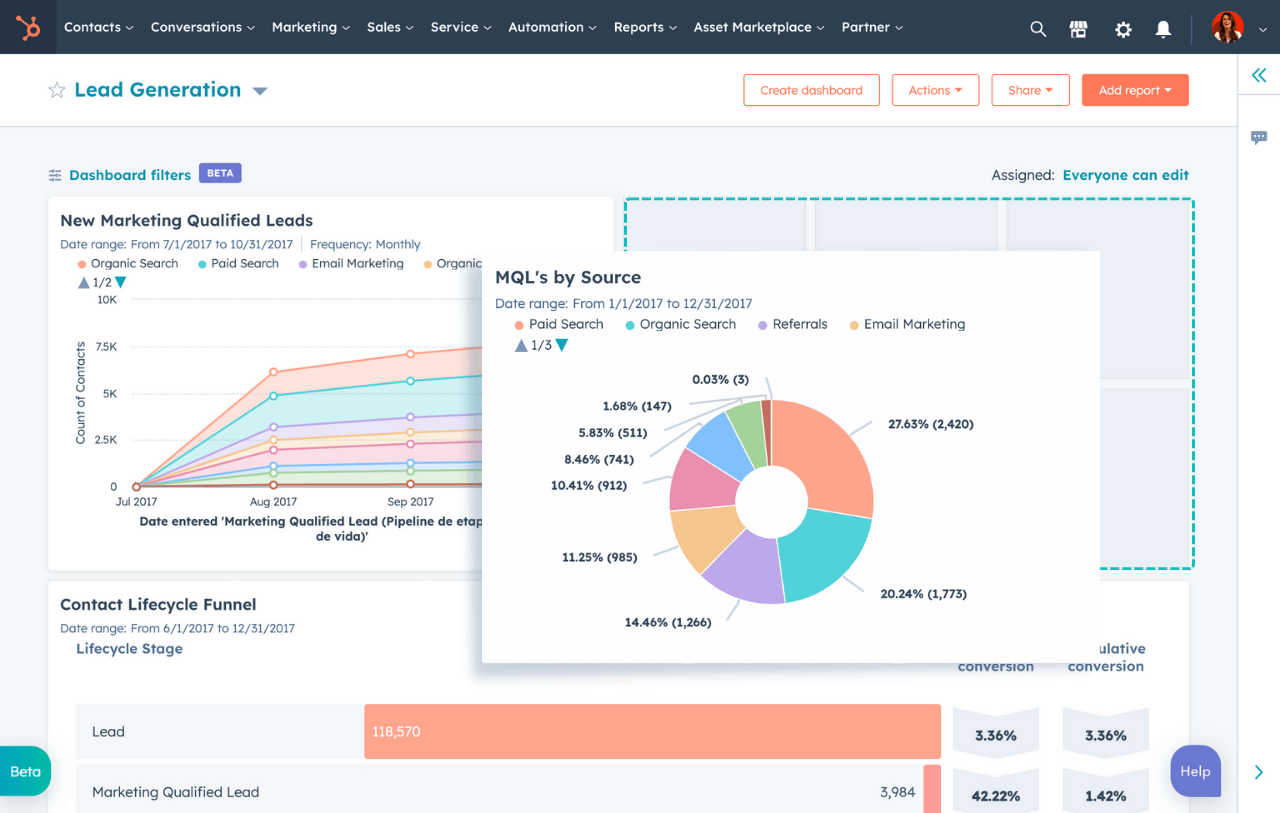
Why It Beats Constant Contact
- Better All-in-one solution;
- Deeper analytics;
- More advanced workflows;
- Fully-featured CRM integration.
Key Features
- Email marketing tools;
- Built-in CRM solution;
- Robust form builder;
- Integrations with all major marketing solutions;
- Landing page builder;
- Advanced segmentation.
Pros & Cons
| ✅ Pros | ❌ Cons |
| User-friendly interface | High cost at scale |
| Generous free plan | Steep learning curve |
| Great CRM integration | Basic templates |
| Insightful reporting |
Constant Contact vs HubSpot
Constant Contact provides a solid set of email marketing features, perfect for dipping your toes into the email marketing waters. However, HubSpot is a comprehensive marketing and sales platform that dwarfs Constant Contact in terms of functionality.
If you need powerful CRM tools, sophisticated marketing automation, landing pages, and a unified platform to manage the entire customer lifecycle, HubSpot is the clear winner in Constant Contact vs HubSpot debate.
GetResponse — Versatile Platform with Automation, Webinars, Funnels
GetResponse delivers a well-rounded mix of affordability and advanced functionality for businesses that want more than just basic email marketing.
Best for: B2B & SaaS companies looking to plan complex email automations and CRM integrations;
GetResponce Pricing: Starts at $15/month for up to 1,000 contacts + unlimited emails;
Free plan: Available for up to 500 contacts + 2,500 monthly emails.
The platform makes campaign creation simple with its drag-and-drop editor, AI-powered content generator, and a wide selection of pre-designed templates. Intelligent send-time optimization ensures your emails reach subscribers at the right moment, while detailed analytics provide clear insights into performance.
GetResponse has carved out a place among Constant Contact competitors by going beyond email into funnels, webinars, and AI-powered campaign tools. It’s a comprehensive marketing solution that helps streamline processes, save time, and drive better engagement without the steep costs of enterprise platforms.
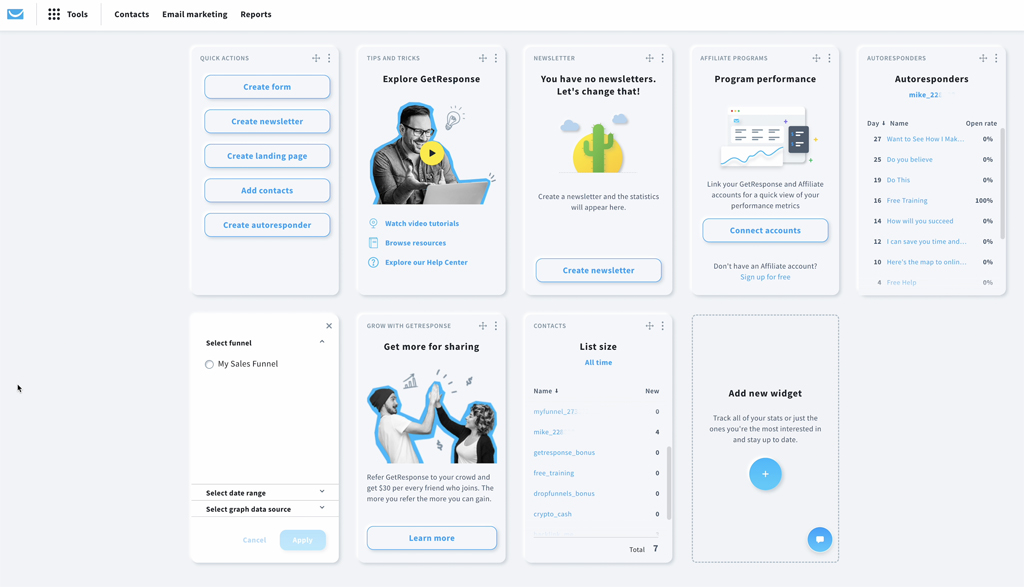
Why It Beats Constant Contact
- More budget-friendly;
- Visual workflow builder;
- Free plan;
- Deeper reporting.
Key Features
- Intuitive website builder;
- AI email generator;
- Webinar hosting;
- Extensive template library;
- Conversion-focused tools.
Pros & Cons
| ✅ Pros | ❌ Cons |
| Great conversion funnel functionality | Limited A/B testing |
| Design & spam testing tools | Clunky interface |
| Top-notch webinar hosting capabilities | Steep price jumps when upgrading |
| Intuitive visual workflow builder |
Constant Contact vs GetResponse
Constant Contact offers a straightforward, beginner-friendly platform with essential email tools and basic ecommerce features like abandoned cart reminders. It’s a solid option for small businesses or marketers who want simplicity without getting lost in advanced settings.
GetResponse, on the other hand, takes things further with a more comprehensive toolkit. Beyond email marketing, it provides a visual automation builder, AI-powered content generation, advanced analytics, and even a website builder. While Constant Contact is easier for newcomers, GetResponse is better suited for businesses looking to scale with more sophisticated automation and all-in-one marketing features.
Brevo — Affordable Multichannel Platform with Strong Automation
Brevo (formerly Sendinblue) is an affordable Constant Contact alternative that combines email, SMS, and CRM under one roof. That’s why they offer a comprehensive customer engagement software suite that brings all your communication under a single dashboard.
Best for: Ecommerce startups looking for an budget-friendly email automation solution;
Brevo Pricing: Paid plans start at $8/month for up to 500 contacts + 5,000 monthly emails;
Free plan: Available for up to 500 contacts + 5,000 emails/month.
With Brevo, you can manage email campaigns, SMS marketing, live chat, and even WhatsApp messaging from a single, centralized platform. This alone makes Brevo a powerful alternative to Constant Contact, but that’s not all.
Constant Contact provides basic integrations, but Brevo takes it up a notch with a vast library of pre-built integrations for popular CRMs, ecommerce platforms, and other business tools.
This connectivity ensures your marketing efforts are synchronized across all channels, allowing you to deliver a cohesive and personalized customer experience.
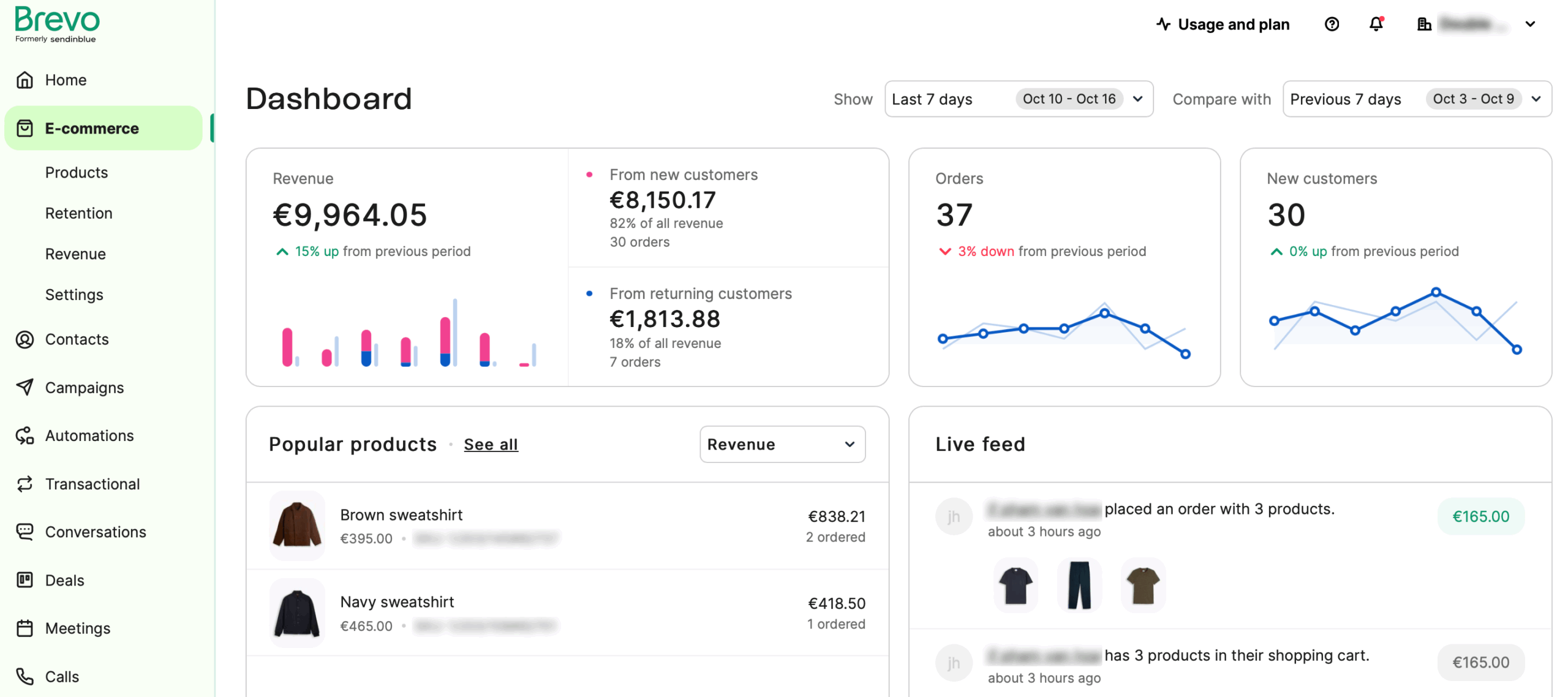
Why It Beats Constant Contact
- Free plan;
- Built-in CRM;
- Broader range of ecommerce integrations;
- Multi-channel marketing.
Key Features
- Personalized automated messages;
- Built-in CRM tools;
- High-performing transactional emails;
- Prebuilt automation workflows;
- Landing page builder.
Pros & Cons
| ✅ Pros | ❌ Cons |
| Multi-channel support | Inconsistent deliverability rate |
| CRM included | A/B testing locked behind pricier tiers |
| Affordable pricing structure | Reporting lacks advanced funnel tracking |
| Strong transactional email support |
Constant Contact vs Brevo
Constant Contact shines with its ease of use and email marketing focus, particularly for small businesses seeking simplicity. It offers a solid set of features like email automation, social media tools, and basic reporting.
Brevo, on the other hand, boasts a more extensive feature set encompassing advanced marketing automation, SMS marketing, and a broader range of integrations, making it a great choice among Constant Contact alternatives.
Mailchimp — Popular, Beginner-Friendly, Strong Integrations
Mailchimp is a household name in the world of email marketing, and for a good reason. Its user-friendly interface, intuitive design, and robust feature set make it an excellent choice for businesses of all sizes, especially those seeking straightforward Constant Contact alternatives.
Best for: Small and medium-sized businesses seeking an affordable email marketing tool;
Mailchimp Pricing: Paid plans start at $20/month for up to 500 contacts and up to 6,000 emails/month;
Free plan: Free plan available. Includes up to 500 contacts and 1,000 monthly email sends.
Constant Contact and Mailchimp are often compared because they provide many of the same core features. Both platforms include an intuitive drag-and-drop email editor, a variety of pre-designed templates, and straightforward list management tools.
However, Mailchimp sets itself apart with its broader selection of integrations, more advanced reporting and analytics, and a wider range of pricing plans to suit different needs and budgets.

Why It Beats Constant Contact
- Free plan;
- Larger template library;
- More robust analytics;
- Better optimized for scalability.
Key Features
- Drag-and-drop email builder;
- Essential automation features;
- Appointment scheduler;
- Top-tier audience segmentation tools;
- Extensive integrations;
- Rich template library.
Pros & Cons
| ✅ Pros | ❌ Cons |
| Powerful automation | Advanced features hidden behind paid plans |
| User-friendly interface | Predatory pricing structure |
| State-of-the-art AI tools | Customer support can feel slow at times |
| Wide range of integrations |
Constant Contact vs Mailchimp
Both platforms offer user-friendly interfaces and essential email marketing tools, making them suitable for beginners. However, Mailchimp edges out Constant Contact with its more modern design, broader integration options, and slightly more advanced reporting features
If you’re comfortable navigating a slightly larger platform and appreciate having more flexibility and data insights, Mailchimp comes out on top in the Constant Contact vs Mailchimp debate.
Omnisend — Best for Ecommerce Email and SMS Integration
Omnisend is an email marketing platform and one of the top Constant Contact alternatives, specifically designed to boost online sales. With integrations for popular platforms like Shopify, WooCommerce, and BigCommerce, Omnisend makes it easy to connect your store and start sending targeted email campaigns that drive conversions.
Best for: Ecommerce brands looking for a budget-friendly email marketing solution;
Omnisend Pricing: Starts at $11/month for up to 500 contacts + 6,000 monthly emails;
Free plan: Available for up to 250 contacts + 500 monthly emails.
But Omnisend goes beyond basic email marketing by integrating SMS messaging into your automated workflows. Send abandoned cart reminders, shipping notifications, or promotional texts to engage customers on a more personal level and recover lost sales.
Omnisend also boasts advanced segmentation capabilities, allowing you to target specific customer segments based on their purchase history, browsing behavior, and more.
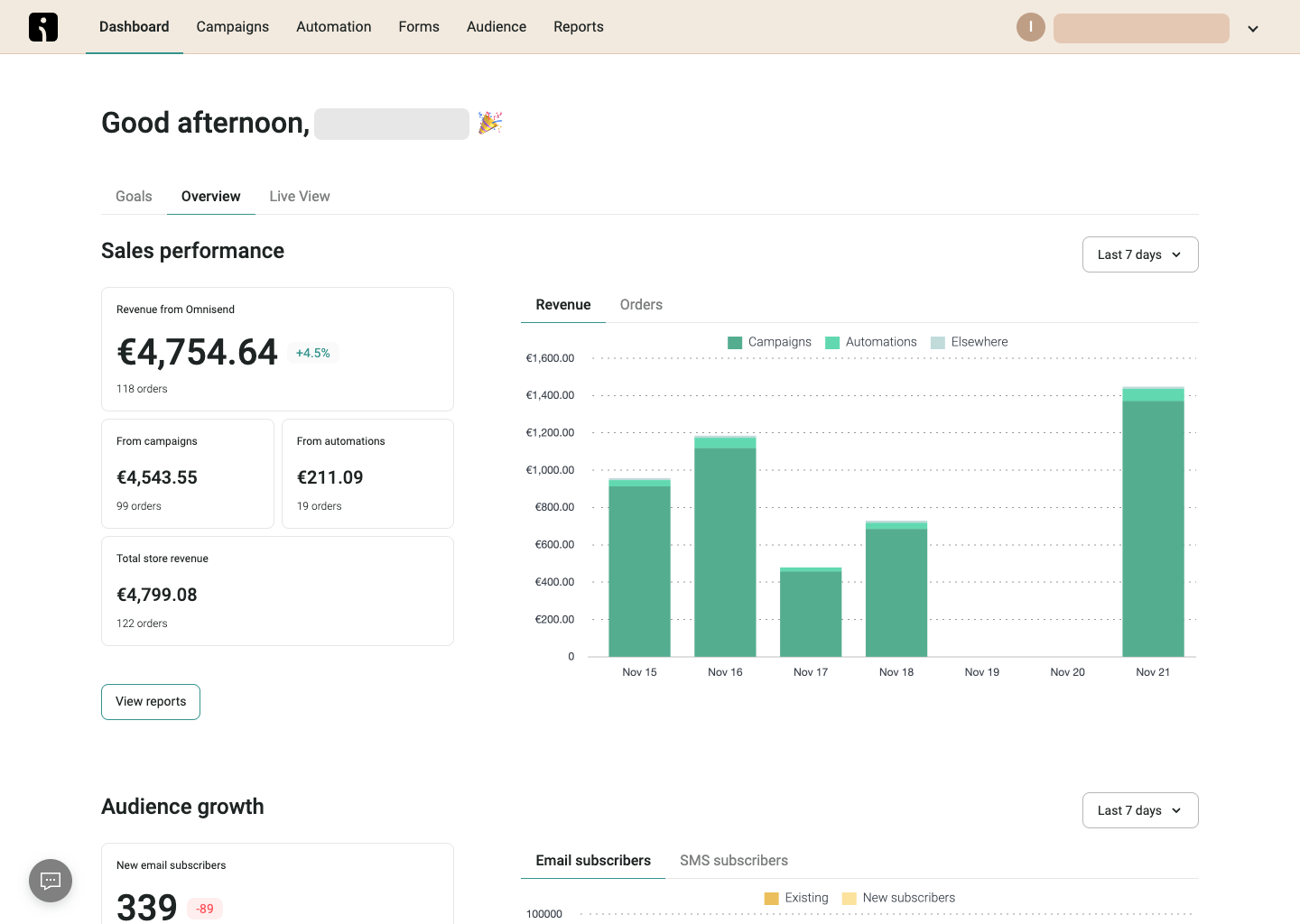
Why It Beats Constant Contact
- Better reporting;
- Superior automation;
- Stronger audience segmentation;
- Omnichannel integrations.
Key Features
- Pre-built ecommerce automations;
- Product recommendations;
- Integrated SMS marketing;
- Ecommerce platform integrations;
- Revenue attribution reporting.
Pros & Cons
| ✅ Pros | ❌ Cons |
| Ready-to-go automation workflows | Restrictive template editor |
| Multi-channel marketing | Limited integrations |
| Excellent 24/7 chat support | |
| A-grade personalization features |
Constant Contact vs Omnisend
Constant Contact offers a simpler, more user-friendly platform with essential ecommerce features like abandoned cart emails and automated post-purchase series. It’s a good starting point for smaller businesses or those new to email marketing.
Omnisend, on the other hand, is built for more advanced ecommerce marketing, providing robust automation workflows, deeper segmentation capabilities, and omnichannel integrations beyond email and SMS, making it one of the top cheaper Constant Contact alternatives.
AWeber — Reliable with Good Templates, but Less Advanced Automation
AWeber is a well-established player in the email marketing space, known for its intuitive interface, reliable deliverability, and excellent customer support. It’s an ideal alternative to Constant Contact for beginners looking for an easy-to-use platform with all the essential features to get started.
Best for: Entrepreneurs, small businesses, and creators who want a straightforward email marketing platform with responsive support;
AWeber Pricing: Starts at $13/month for up to 500 contacts + 5,000 monthly emails;
Free plan: Not available.
For starters, AWeber shines when it comes to landing pages, giving you more freedom than Constant Contact’s basic setups. While Constant Contact keeps things simple, AWeber lets you create landing pages that look fresh and are built to convert visitors into loyal customers.
With its user-friendly interface, comprehensive features, and responsive phone support, AWeber is an excellent option for businesses new to email marketing.
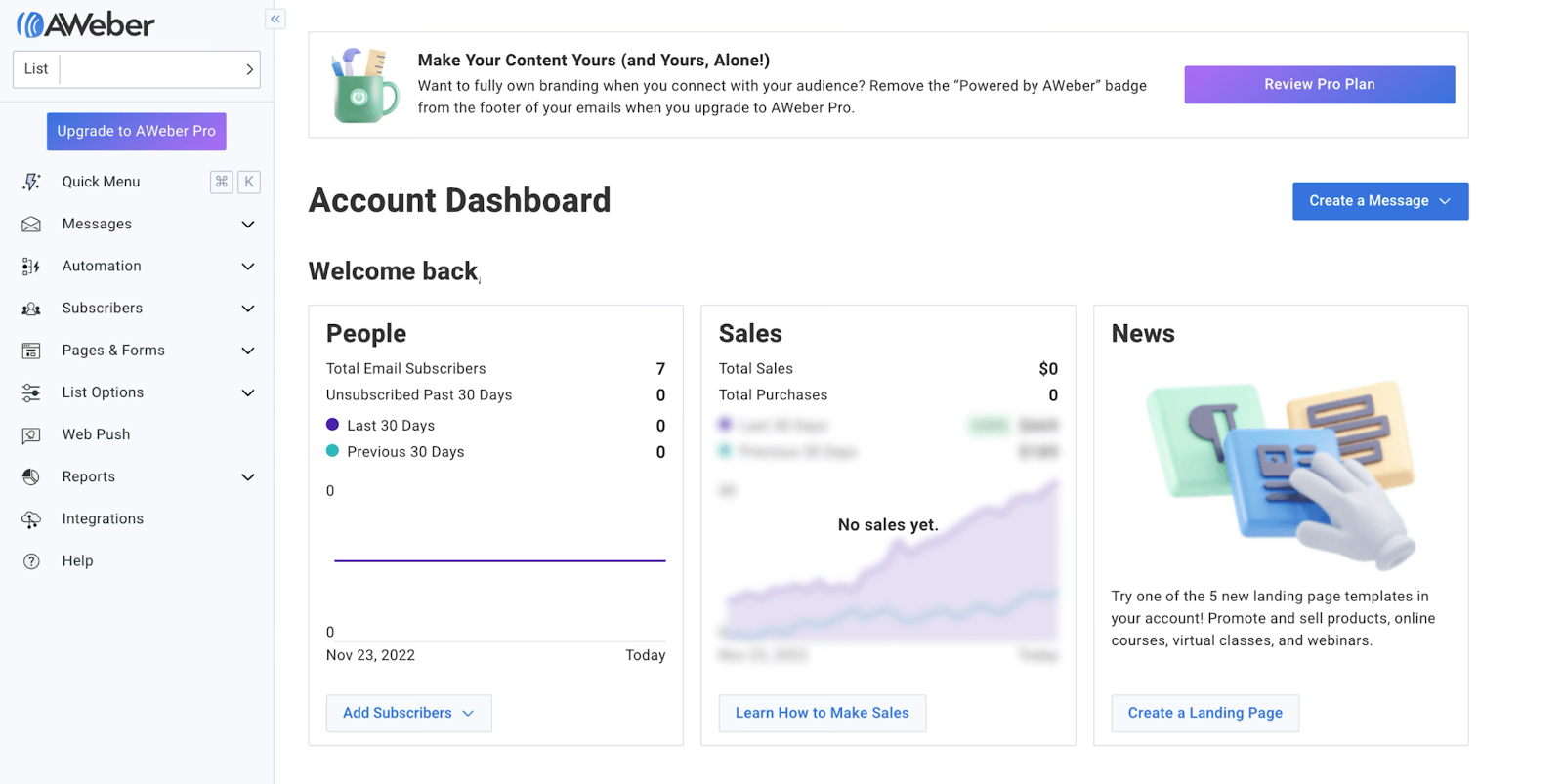
Why It Beats Constant Contact
- Superior customer support;
- Larger library of templates;
- More affordable entry-level plans;
- Stronger deliverability rate.
Key Features
- AMP email support;
- Sign-up form builder;
- Campaign analytics tools;
- Seamless native integrations.
Pros & Cons
| ✅ Pros | ❌ Cons |
| Reliable deliverability | Fewer native integrations than competitors |
| Real-time analytics | Limited advanced segmentation & conditional logic |
| Seamless ecommerce integrations | Basic interface |
| Excellent support |
Constant Contact vs AWeber
AWeber and Constant Contact are both solid choices for businesses seeking an easy-to-use email marketing platform, but AWeber pulls slightly ahead among Constant Contact alternatives regarding automation and deliverability.
AWeber boasts a more robust autoresponder feature set, allowing for more sophisticated email sequences and targeted follow-ups. Additionally, AWeber has a strong reputation for reliable email delivery, ensuring your messages reach your subscribers’ inboxes.
Campaign Monitor — Excellent Design Tools and Salesforce Integration
If beautiful, professionally designed emails are your top priority, Campaign Monitor is a standout among Constant Contact alternatives. This Constant Contact competitor is known for its stunning email templates and intuitive design tools, allowing you to create visually impactful campaigns that capture attention and drive results.
Best for: Small and medium-sized ecommerce businesses looking for reliable Constant Contact alternatives;
Campaign Monitor Pricing: Starts at $12/month for up to 500 contacts + 2,500 emails/month;
Free plan: Not available. 30-day free trial available.
During my time with Campaign Monitor, I was impressed by how easy its drag-and-drop email builder makes it to customize templates or create your own designs from scratch. You can also access a library of high-quality stock photos and illustrations to add a touch of visual flair to your emails.
Beyond its design prowess, Campaign Monitor offers a solid set of features, including automation, segmentation, and analytics. You can create targeted email sequences, personalize content based on subscriber data, and track key metrics to measure your campaign’s success.
Of course, this requires the Salesforce extension, which comes at an extra price, but the results quickly pay off—you get to save time, send emails that feel more personal, and see better results from your campaigns.
At the end of the day, Campaign Monitor is a sleek and professional alternative to Constant Contact for any design-heavy business.
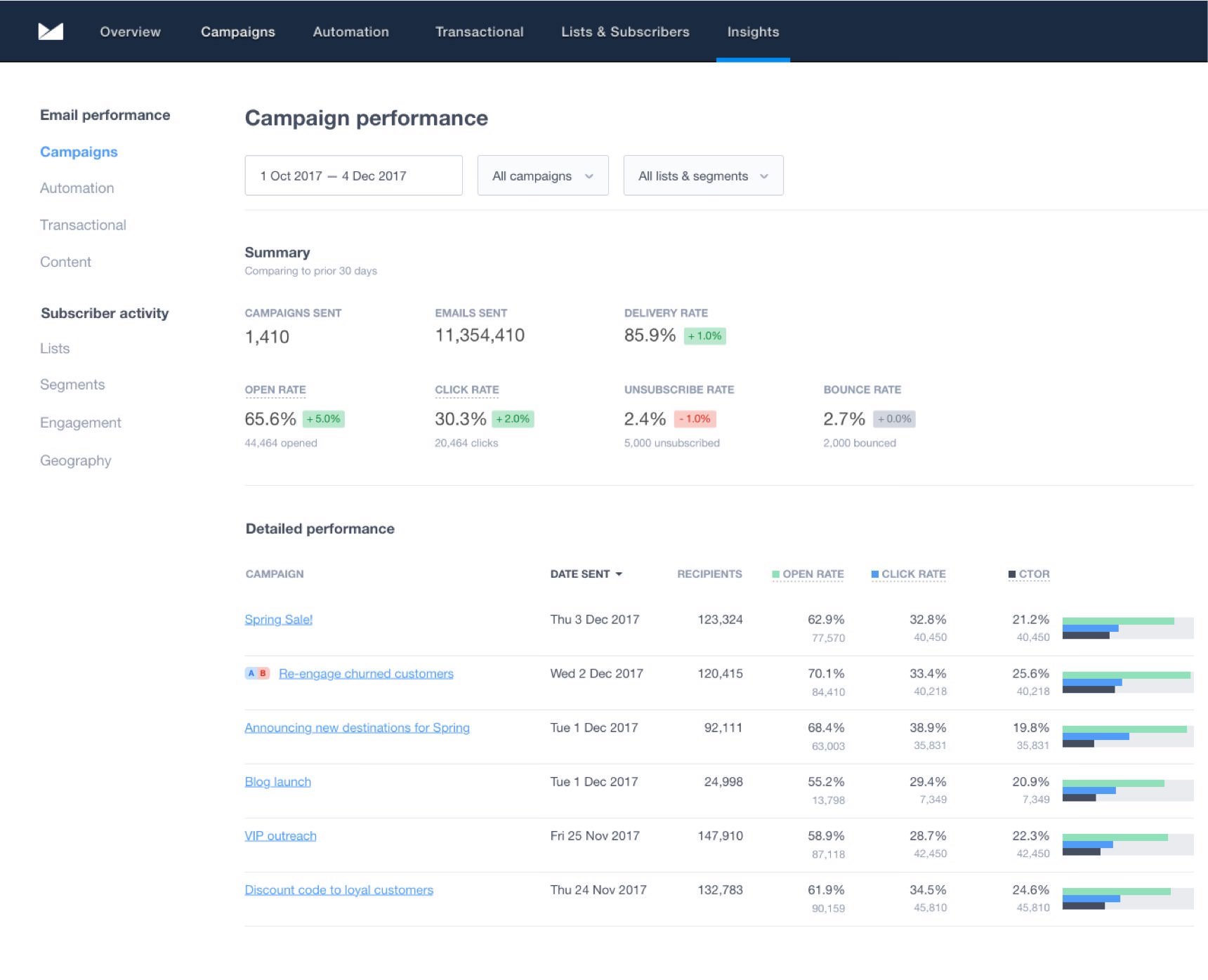
Why It Beats Constant Contact
- More advanced reporting;
- Visual automation builder;
- Advanced list segmentation;
- Superior personalization elements.
Key Features
- Intuitive drag-and-drop builder;
- Advanced segmentation with custom fields;
- User-friendly automation builder;
- Hyper-targeting capabilities;
- Great A/B testing tools.
Pros & Cons
| ✅ Pros | ❌ Cons |
| Intuitive drag-and-drop email builder | Automation lacks some advanced branching |
| Professional email templates | Limited CRM capabilities |
| Reliable email deliverability | API access locked behind higher tiers |
| Responsive customer support |
Constant Contact vs Campaign Monitor
If stunning, visually appealing emails are your top priority, Campaign Monitor trumps Constant Contact. While both platforms offer email templates and design tools, Campaign Monitor takes design to the next level.
With its sleek templates, advanced customization options, and access to high-quality stock imagery, Campaign Monitor allows you to create truly eye-catching emails that stand out in crowded inboxes.
Email Marketing Platforms Cost Calculator
Finding the best email marketing solution that matches your desired subscriber limit, budget, not to mention feature needs, can be a real hassle. That’s why we built Sender’s price calculator—a quick way to compare plans and see exactly what fits your business.
FAQs
Is there a free version of Constant Contact?
No, Constant Contact doesn’t offer a free version. However, Constant Contact alternatives like Sender offer robust free plans, providing you with excellent free email marketing tools without the cost.
Which Constant Contact alternative supports SMS marketing?
Sender provides SMS marketing campaigns, allowing you to combine your email and text message marketing strategies. This feature makes it a strong replacement choice compared to Constant Contact and some other solutions that may not offer this integrated approach.
